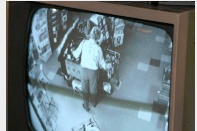 Part of your internal auditing process should be a section devoted specifically to your store’s safety and security measures. Some points should be audited on a daily basis, while others can be less frequently, such as once a month. When you monitor your store’s security measures consistently, you are able to respond more quickly to any malfunctions or procedural breakdowns.
Part of your internal auditing process should be a section devoted specifically to your store’s safety and security measures. Some points should be audited on a daily basis, while others can be less frequently, such as once a month. When you monitor your store’s security measures consistently, you are able to respond more quickly to any malfunctions or procedural breakdowns.
One of the easiest security features to audit on a daily basis is your EAS and security tags. These are the anti theft devices put onto your merchandise that provide a visual deterrent to potential shoplifters. Ensuring 100% compliance is not only a stronger deterrent, but also reinforces the concept of operational accuracy and a check and balance system internally. Employees who are held accountable to stringent operational standards are less likely to look for opportunities to steal from their employer.
A daily audit of EAS tags consists of a department rotation and a spot check of those items. There is no need to check every single item, unless there is a pattern of under performance in those areas. The best way to do the daily audit is to only audit 20 or so items on a given day. From there, it is easy to determine the percentage of accuracy. If out of 20 items only ten have the appropriate tagging, you have 50% compliance. You can do more or less based upon your actual needs, but a similar process will be the most time efficient, with the most accurate results.
Along the same lines is auditing the EAS alarms at your doors. These alarm activations should be reviewed by CCTV whenever possible. You need to understand why you are having alarm activations, and how your employees are responding to them. You can bet that the shoplifters coming into your store are watching for this, so don’t give them the advantage by being oblivious to what is going on in your stores.
If an EAS alarm is activated, your employees should respond to the person going out the door and offer their assistance to deactivate any tags that were missed during checkout. You should look to see if you have a specific employee who is not deactivating tags properly, causing unnecessary alarms. You should also review to see if you have the same person setting off alarms, they might be a shoplifter to watch out for. These audits can be done weekly rather than daily and still prove effective.
One area in particular to audit at 100% is alarm activations before and after your store closes. While most of the alarms are likely to be dismissed by stock/ freight movement to replenish selling shelves, you want to watch out for that one that is not. The alarm activation you are looking for is caused by an employee stealing. It is not unheard of for an employee who is stealing from their store to try and take the merchandise out after hours. Fewer people are around to notice, and the employee can take more merchandise out at a time, without arousing suspicion. If no one goes back to review these after hours alarms, the employee can go undetected for months or sometimes even years.
Any reputable alarm company, such as Checkpoint, will give you a daily and weekly listing of alarm activations. The report should include the time and the date, allowing you to cross reference with your CCTV recordings. By looking at the times, you can quickly determine which alarms are after hours. After hours alarms should be conducted as soon as the report is received. If an employee actually is stealing, it needs to be swiftly investigated and dealt with to prevent further financial losses.



